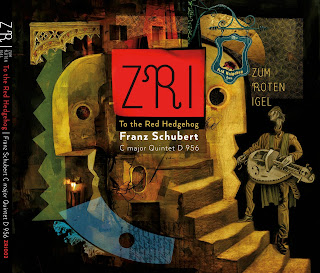Schubert C Major Quintet D956; ZRI
Reviewed by Robert Hugill on Feb 01 2017
Star rating:
Schubert's classic quintet re-invented for a Hungarian klezmer band, in a revelatory performance
ZRI (Zum roten Igel), named for the major concert venue in Vienna, have followed up their disc of Brahms with a similar treatment of Schubert's C Major Quintet D956. So we have Schubert's quintet re-orchestrated for the ZRI line-up, Ben Harlan (clarinet/bass clarinet), Max Baillie (violin), Matthew Sharp (cello/baritone), Jon Banks (accordion), Iris Pissaride (santori), and interspersed with traditional folk-melodies. It all sounds rather unlikely, why on earth would you need to re-orchestrate Schubert's divine quintet, and what has it got to do with Hungarian gypsy tunes? Quite a lot, as it turns out.
Reviewed by Robert Hugill on Feb 01 2017
Star rating:
Schubert's classic quintet re-invented for a Hungarian klezmer band, in a revelatory performance
ZRI (Zum roten Igel), named for the major concert venue in Vienna, have followed up their disc of Brahms with a similar treatment of Schubert's C Major Quintet D956. So we have Schubert's quintet re-orchestrated for the ZRI line-up, Ben Harlan (clarinet/bass clarinet), Max Baillie (violin), Matthew Sharp (cello/baritone), Jon Banks (accordion), Iris Pissaride (santori), and interspersed with traditional folk-melodies. It all sounds rather unlikely, why on earth would you need to re-orchestrate Schubert's divine quintet, and what has it got to do with Hungarian gypsy tunes? Quite a lot, as it turns out.
Zum roten Igel (The Red Hedgehog) wasn't just the name of the concert venue, it was the name of the tavern behind as well. The tavern where classical musicians would go to carouse and to listen to the Hungarian gypsy folk musicians, and it is this intoxicating mix that ZRI seeks to evoke, the fluidity of the genres. Schubert's contemporaries would have heard these folk melodies regularly, and been able to detect them and their influence in classical music, just the way we can listen to music and hear the contemporary resonances in it. Without a sense of the music around at the time, it is difficult for us.
So ZRI intersperse Schubert with folk melodies from a variety of traditional European backgrounds, Hungarian pub tunes, Jewish klezmer dances, shepherd melodies from the Carpathian mountains, and an improvised wedding lament. These folk melodies don't just come between the movements, they are inserted into them as well. So that the first part of the opening Allegro ma non troppo flows into Cristinel si Iulian Turturica which then flows back into the second half of the Allegro. And not just folk melodies, Der Leirman from Schubert's Winterreise (sung by Matthew Sharp) appears between the Trio of the third movement and the return of the Presto.
The re-writing of the Schubert for an ensemble which includes an accordion and a santori (a type of cimbalom) really brings out the hidden folk influence of the Schubert. When listening to the disc you have to pay careful attention, there are moments in the quintet which sound like pure klezmer in this version. The re-orchestration has been sensitively done, and the players really bring out the beauties of Schubert's music in its new guise. But it also great fun, a wonderfully unlikely but intoxicating mix which really does evoke the idea of Schubert going home from the tavern (and he lived next door at one point) humming a tune which appears, in a different guise, in his latest piece.
It is the quality of the music making which really makes this disc, the players are able to move from serious Schubertian intensity to Hungarian gypsy passion and back again without even drawing breath. They make the disc an intoxicating mix, so that it works on multiple levels. On the one hand, it helps tease out the folk influences in Schubert, twinning moments in the quintet with folk-songs and bringing out the folk feel of Schubert's writing. On the other hand, it is simply great fun to listen to, the sort of mash up you could imagine the musicians at Zum roten Igel coming up with.
Franz Schubert (1797-1828) - C major Quintet D 956 interspersed with traditional songs
ZRI: Ben Harlan (clarinet/bass clarinet), Max Baillie (violin), Matthew Sharp (cello/baritone), Jon Banks (accordion),
Recorded at Childwickbury Manor House, 15 &16 May 2016
ZRI002 1 CD
The disc is available via the ZRI website or from Bandcamp.
Elsewhere on this blog:
- We're crowdfunding for Quickening, a disc of new settings of Rowan Williams, AE Housman, Ivor Gurney, Christina Rossetti by Robert Hugill coming out on the Navona Records label, please visit http://www.crowdfunder.co.uk/quickening
- Pointed delight: Gilbert & Sullivan's Patience from ETO
- Its heart in the right place: ETO's Tosca - Opera review
- Sacred and Profane: Netherlands Chamber Choir and Peter Dijkstra - Concert review
- Shedding light on a forgotten Romantic: Mehul's Uthal - CD review
- Sunday afternoon delights: I Musicanti at St John's Smith Square - concert review
- Mescaline, therapy & the Berlin Wall: rough for opera #15 - opera review
- Ancient and Modern: Carolyn Sampson and Matthew Wadsworth in Dowland, Britten, Goss, Purcell - concert review
- Imaginative & engaging: Tara Erraught at Rosenblatt Recitals - concert review
- Powerful and deeply felt: James MacMillan's Stabat Mater - CD review
- Revitalising her reputation: Francesca Caccini's Alcina - CD review
- Home









%20as%20Leporello%20and%20Erik%20Tofte%20(back%20to%20camera%20in%20garnet%20shirt)%20as%20Giovanni%20-%20Don%20Giovanni.jpg)


No comments:
Post a Comment